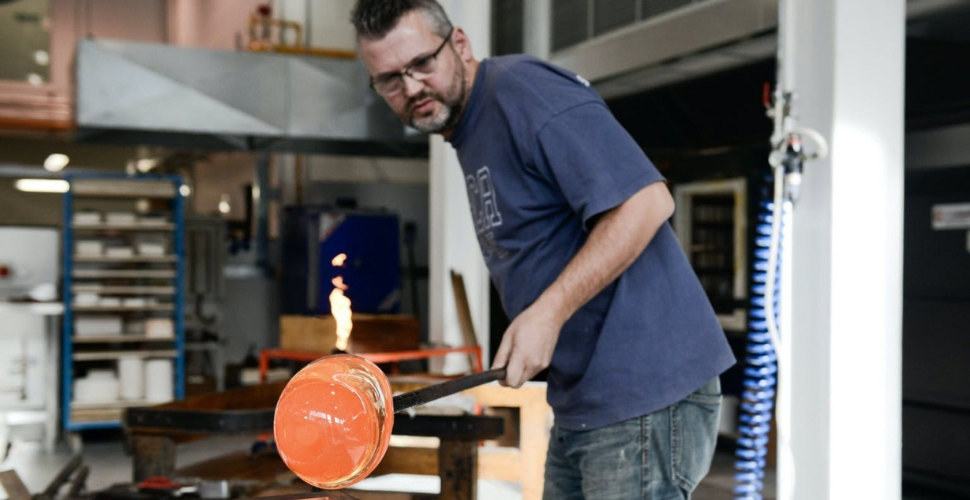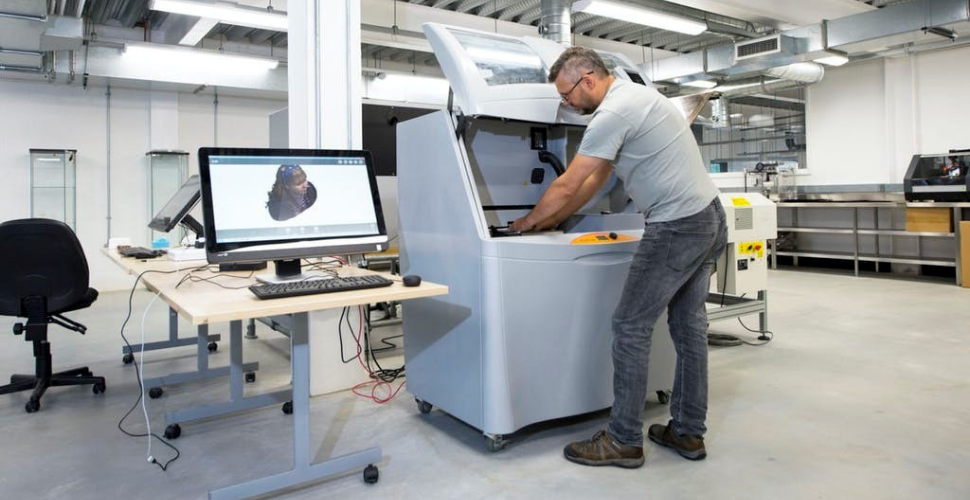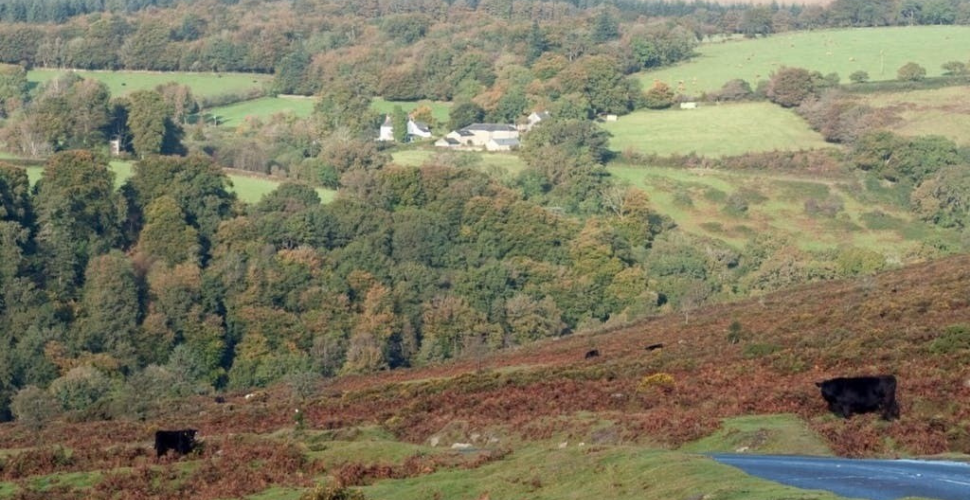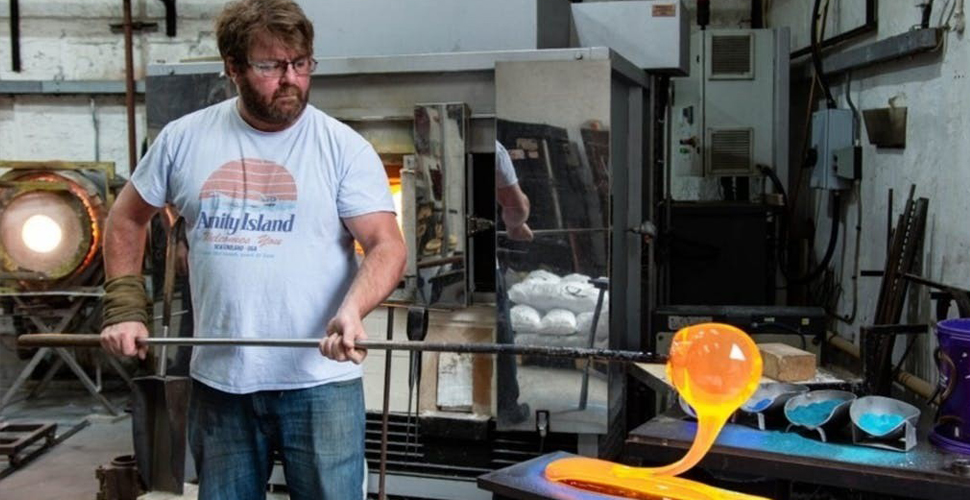Following a successful Crowdfunder campaign, the newly founded glass company plans to build a sustainable glassblowing workshop on Brimpts Farm, Dartmoor
Ian Hankey, Principal Technician at Fab Lab Plymouth in Plymouth College of Art, recently completed a successful campaign with Crowdfunder for the Upcycled Glass Project, working with Andy Bradford, a farmer from Brimpts Farm in Dartmeet, Dartmoor, and Richard Glass, an award winning designer and expert glassmaker. As a result, Ian and a number of expert colleagues are now launching the Upcycled Glass Company CIC.
The Upcycled Glass Project Crowdfunder successfully raised the initial funding of over £10,000 to build a new sustainable glassblowing workshop on Brimpts Farm, where the team intend to implement a circular economy model and upcycle local waste glass (the majority of which cannot currently be recycled) into new glass suitable for use in handmade art and design products, utilising a mixture of new technologies, modern farming methods and historical glass mixing processes that go back to the 17th century.
Devon Climate Challenge has provided £5,000 of funding to the campaign, as part of the #BackTheFuture initiative, in which Devon County Council and Crowdfunder have teamed up to support projects who are tackling the climate emergency.
‘We were delighted that the Upcycled Glass Company received a large match fund pledge from Crowdfunder’s #BackTheFuture, to support turning its ideas into reality. This might not have happened without Crowdfunder and Plymouth College of Art’s collaboration on the iMayflower project, leading to Ian’s involvement through Fab Lab Plymouth. He quickly realised that crowdfunding would be a perfect way for him to raise pump priming money for his own creative business,’ said Dawn Bebe, Director of Crowdfunder.co.uk.
The concept for the Upcycled Glass Company CIC brings together multiple strands of glass expert and Master Glassmaker, Ian Hankey. After initially leaving school with no qualifications due to undiagnosed dyslexia, Ian has worked in the glass industry for over 40 years, from his first apprenticeship at Pilkington Glass and later managing the hot glass workshop at the Royal College of Art and managing Teign Valley Glass Studios, to his work to establish in 2014 and subsequently manage Fab Lab Plymouth at Plymouth College of Art.

Ian Hankey blows glass at Plymouth College of Art
During this period, Ian studied for his BA (Hons) 3D Design at Buckinghamshire College, received a Commendation for his MA at the Royal College of Art, and while working as Hot Glass Instructor at the RCA, he also gained a Distinction on his PGCE in Teaching and Learning Art, Design and Communication at the London Institute. Ian has delivered papers about glass and methods and approaches of thinking and making at conferences hosted by Cambridge New College, The V&A, Liverpool University, University for Creative Arts and Plymouth College of Art, and his research has been published by the Society of Glass Technology, Columbia University and Plymouth College of Art.
In 2018, Ian stepped back from his role as Manager of Fab Lab Plymouth to a role as Principal Technician, in order to spend more time working in the glass department at Plymouth College of Art, and to pursue his personal work recreating a number of historical glass processes, particularly focusing on recipes and processes from the Renaissance. Alongside his work with glass, Ian has developed his own skills in the Fab Lab, learning specific and advanced CAD CAM processes, and researching historical glassmaking processes. During this period he became a qualified Autodesk Instructor and expert in CAD (Fusion 360, Rhino, Meshmixer, Keyshot), gaining expertise in 3D printing, 3D scanning, CNC milling and routing, laser cutting, waterjet cutting and vinyl cutting.
Ian said: “Throughout my life, dyslexia and reflective rationality have shaped the path of my career, which is to say that I work with my hands and my heart. This direct approach has enabled me to solve problems at times when others could not. My tacit understanding of and approach to glass led me almost 20 years ago to help Imperial College and The V&A to develop a ‘cure’ for glass disease (the corrosion of historical Venetian glass), solving a problem that many material scientists and experts in the field could not.
“As a result of working with glass for most of my life, I’ve had incredible opportunities to develop new techniques, recreate old methods of glass blowing and think about how some of these skills can be combined to solve environmental problems that face us as a society. Adding my knowledge of glass to some of the collaborative opportunities that we create in Fab Lab Plymouth have led to so much innovation. I’ve spent over 20 years developing methods of reducing emissions and reducing the costs of building and running glass equipment, from creating a portable glass furnace that cuts emissions over traditional furnaces by up to 70% to developing more efficient solar panels and helping to develop small-scale CO2 recapture systems.

Ian Hankey in Fab Lab Plymouth
“Whether we like it or not, we’re living through a climate emergency. Everything I’ve seen and done in my life points to the fact that for every environmental problem that we solve, someone with money is going to come along and try to use that solution to create more money for themselves, undermining the positive change that could have benefited society. The only way to tackle societal problems of sustainability is to change the framework we’re working in and find new ways to work together. The Upcycled Glass Company CIC is my attempt to bring into the world one small part of the change that we need to live in a more sustainable way.
“Thanks to everybody who contributed to our successful Crowdfunder, we can start work building a small furnace in the grounds of Brimpts Farm on Dartmoor, which we hope to have finished by the end of 2021. Did you know that UK glassblowers pay up to £2,500 a ton to import ‘art’ glass material from the EU? Worse than that, in the UK and EU, we recycle about 71% of container glass, but end-of-life building waste glass, such as window glass, is almost never recycled into new glass products, and mostly ends up in landfill
“On Brimpts Farm in 2022, we plan to use a mix of new technologies, modern farming methods and historical glass mixing processes to use the furnace that we’ve built to develop a technique to refine the waste glass from nearby Teign Valley Glass Studios. By melting waste glass and using locally harvested bracken from Brimpts Farm (with the added bonus that in harvesting these plants we’ll create wildflower meadows), we’ll reduce emissions for road transport and shipping across the world, and demonstrate a way to reduce the landfill waste glass mountains, which are recognised globally as a major environmental problem.
“Additionally, through my work at Fab Lab Plymouth, I’ve provided technical support to Barnaby’s Brewhouse, helping to develop a small-scale CO2 recapture system. If I fit a similar system to the new glass furnace on Brimpts Farm, we’ll be upcycling waste glass that companies currently pay to dispose of, and burning bracken from the local farmland to extract the chemicals that we need. If we power the furnace equipment with methane from the cows and farm slurry, at the end of the process, the only waste product that we create should be water.
“That’s just the start of our sustainability plans, working as part of a circular local economy, where businesses work together for their own benefit, for the benefit of the community and the environment. Alongside acting as Managing Director of the Upcycled Glass Company CIC, I’m going to continue my work at Plymouth College of Art. Fab Lab Plymouth is based here, in an art school with over 160 years of history, allowing new technologies and traditional methods of making to come together, and this is where the solutions to so many problems in society begin to come together.”

Brimpts Farm land
Ian is now preparing to launch the Upcycled Glass Company CIC, with Brimpts Farm owner Andy Bradford, expert glassmaker Richard Glass, Dr Katie Shanks, Dr Sarah Fearn, Victoria Oakley ACR FIIC, and IT and data expert Jamie Kaye.
Dr Katie Shanks has expertise is in designing optics for concentrator photovoltaic applications (including their development from concept to manufacturing and experimental validation) and is currently working on the use of novel materials, such as plastics and biomimicry surface structures, for CPV optics, as well as building integrated CPV windows.
Dr Sarah Fearn is a Research Officer in the Department of Materials at Imperial College and manages the surface analysis lab. Her area of expertise is Secondary Ion Mass Spectrometry (SIMS), ion beam analysis, and materials science. It was during her first post-doctoral studies at Imperial in conjunction with the V&A, that Sarah was introduced to ancient glasses, their properties and possibilities, working with the help of Ian Hankey to monitor the changing composition of replica Venetian glass as it corroded in ambient air.
Victoria Oakley is a conservation professional with 40 years’ experience working in museums, most recently as Head of Objects Conservation Section at the V&A Museum. Her practical expertise lies in the conservation of ceramics, glass, enamels and wax objects, with a particular interest in the chemical deterioration of historic vessel glass.
Together, as the Upcycled Glass Company CIC, this team of experts will collaborate to make the vision of a circular economy model for upcycling waste glass into a reality.
Find out more about Ian Hankey’s work with the Upcycled Glass Company in his Smart Citizens Sustainable Design Talk, ‘Rethinking glassmaking technologies and sustainable business models’, part of the Plymouth Social Enterprise City Festival, hosted by the Plymouth Social Enterprise Network (PSEN). The event takes place online from 5:30pm to 7pm on Thursday 18 November 2021. Register for your free ticket.
Support was given to Ian as part of the iMayflower project and has been supported by The Department for Digital, Culture, Media and Sport, who fund the Cultural Development Fund, which is administered by Arts Council England.
